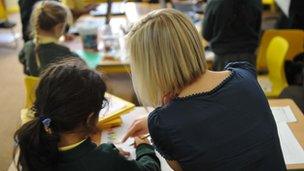Teacher morale 'dangerously low' suggests survey
- Published

Christine Blower, NUT: Teachers think the government is taking education in the wrong direction
Morale among teachers in England and Wales is "dangerously low" and "has declined dramatically in recent months" a survey suggests.
More than half (55%) of teachers polled by YouGov for the National Union of Teachers (NUT) described their morale as low or very low.
Some 77% said the government's impact on education in England was "negative".
The government said teaching was an "attractive profession" with "vacancy rates at their lowest since 2005".
Researchers questioned a "weighted spread" of 804 teachers across England and Wales. Some 88% belonged to a trade union or professional body, and 11% taught in private schools, the rest in state funded schools including academies and free schools. Some 74% were female.
The survey was conducted online last month.
'Wrong direction'
The results suggested that teacher morale had collapsed by 13 percentage points since a similar survey in April.
Then the proportion describing their morale as low or very low was 42%. The figure describing it as high or very high dropped from 27% in April to 15% in December.
Some 69% said their morale had declined since the general election in 2010. Almost three-quarters (71%) said they rarely or never felt trusted by the government.
Some 77% said academy and free school programmes were taking education in England in the wrong direction, while only 5% felt the government was having a "positive" effect on schools.
More than three-quarters (76%) said cuts and austerity measures were having a negative impact on some or most children and their families, with 74% agreeing that children's educational attainment was affected by family income.
More than eight out of ten secondary teachers (81%) said they believed the government's new English Baccalaureate qualification for 16-year-olds was being rushed through without enough consultation.
Some expressed fears that the new qualification encompassed too narrow a range of subjects and that many schools would stop teaching music, art, PE, design technology and religious education.
Almost three-quarters (73%) felt students affected by the GCSE English fiasco should have their papers regraded.
Only 22% supported the new phonics screening check for six-year-olds.
On teachers' pay the survey asked about proposals to replace annual pay increments and give heads and governing bodies the power to determine any rises. Some 77% rejected the idea with 15% in favour and 8% undecided, the figure rose to 79% among academy teachers.
NUT general secretary Christine Blower said: "This survey paints a very sorry picture and is a damning indictment of coalition government policies."
She said the education secretary Michael Gove had "been allowed to rush through reforms based on little or no evidence".
"We need to see education policy being implemented that works for all children and young people and provides them with an education that is exciting and fulfilling.
"It is time the prime minister reined in his education secretary, who has lost the respect of the profession."
'Greater freedom'
A spokesman for the Department for Education said the changes would raise standards "by giving more power to head teachers, attracting the best graduates and professionals, and helping those teaching now to do their jobs even better".
He added that the government had invested £4m "to help existing teachers develop their skills" and was "cutting bureaucracy to allow them to spend more time in the classroom and less on unnecessary paperwork".
"Our academy and free schools programme gives schools greater freedom so that more schools are run by great heads and teachers. Results show they are already having a positive impact, with performance in sponsored academies improving at almost twice the rate of maintained schools in 2011," he added.
- Published12 December 2012
- Published3 December 2012
- Published27 November 2012
- Published21 April 2011
- Published15 April 2011
- Published3 January 2011